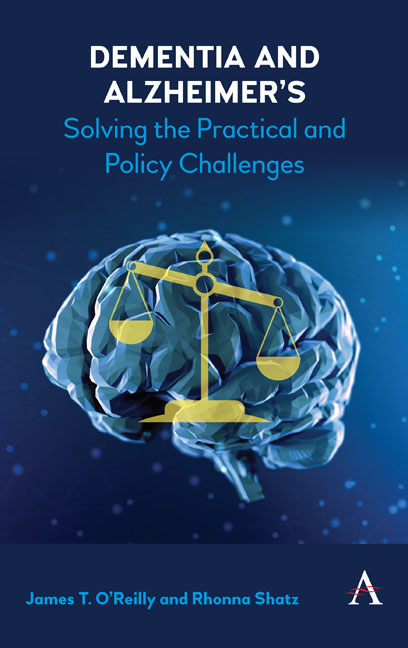Book contents
- Frontmatter
- Contents
- 1 Introduction
- 2 The family dynamics of dementia
- 3 Tort liability related to dementia
- 4 Dementia and private insurance
- 5 Medicare, Medicaid, disability and other government benefits
- 6 Dementia and residential care facilities
- 7 Adult protective services in dementia cases
- 8 Dementia and financial issues
- 9 Dementia in probate and guardianship
- 10 Dementia and employment issues
- 11 Drug research and new product developments for dementia
- 12 Dementia and criminal justice
- 13 Understanding your expert's advice about brain deterioration
- 14 Understanding the causes of Alzheimer's disease
- Appendix: Finding medical reference sources about dementia
- Index
8 - Dementia and financial issues
- Frontmatter
- Contents
- 1 Introduction
- 2 The family dynamics of dementia
- 3 Tort liability related to dementia
- 4 Dementia and private insurance
- 5 Medicare, Medicaid, disability and other government benefits
- 6 Dementia and residential care facilities
- 7 Adult protective services in dementia cases
- 8 Dementia and financial issues
- 9 Dementia in probate and guardianship
- 10 Dementia and employment issues
- 11 Drug research and new product developments for dementia
- 12 Dementia and criminal justice
- 13 Understanding your expert's advice about brain deterioration
- 14 Understanding the causes of Alzheimer's disease
- Appendix: Finding medical reference sources about dementia
- Index
Summary
Overview
Counseling the dementia patient and his or her family is a laudable skill, when done by a counselor who is full of gentle empathy, and who always seeks the safest and most comfortable environment for the patient in her or his later stages of the dementia. But there is no denying that access to high-quality care resources for the dementia patient today will depend upon the private patient's or family's access to money.
A 2016 report found the median costs of nursing home single rooms was $92,738, in a survey of 15,000 long-term care providers. That number would surprise the average middle class reader. Would your family have sufficient funds to keep you, their dementia patient, safe within a well-managed nursing facility for three or four years as your brain deteriorates? It is a frightening prospect that Medicaid residential care sites for the poorest residents with the least attractive services will be the fate of that previously comfortable parent, whose lifetime savings are drained. A 2015 study found “[a] verage total cost per decedent with dementia ($287,038) was significantly higher than that of those who dies of heart disease ($175,136), cancer ($173,383) or other causes ($197,286).”
Dementia does not immediately kill within days or weeks after diagnosis; it is a term to describe a series of symptoms showing progressive deterioration of brain capacity. The family's ability to nurture and protect the dementia patient will be impacted by the set of assets that will be available for the patient's care. “Fewer assets, less comfortable care” is the economic reality.
Access to money truly matters in the dementia story. The fee-for-service medical system, combined with the financially driven investment perspective underlying construction of new residential capacity for elders, makes for a family “scramble,” with members of the family shocked that they must now consider whether the savings available for this patient will match the money demanded by the caregiving system.
Lack of money or inability to manage the patient's assets capably has a consequence: the patient is at the mercy of those family members at home, or of residential care sites which will accept reimbursement at the fixed (and often quite low) state financial assistance payments in programs like Medicaid.
Information
- Type
- Chapter
- Information
- Dementia and Alzheimer'sSolving the Practical and Policy Challenges, pp. 49 - 56Publisher: Anthem PressPrint publication year: 2019
